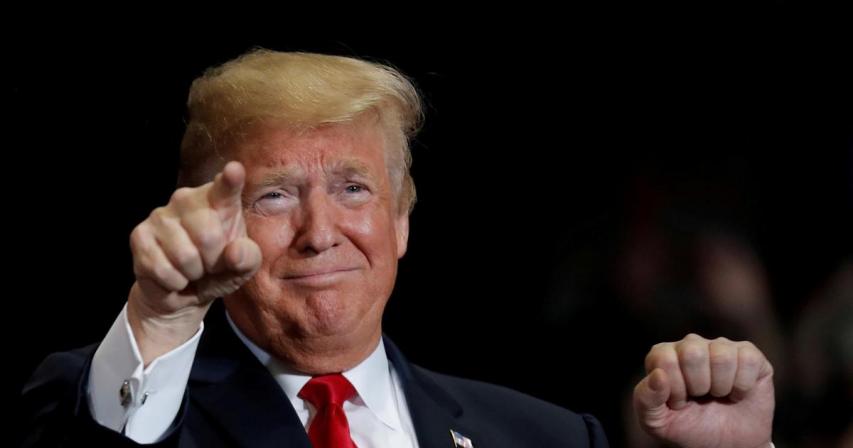What do the results of the US midterms mean for the Middle East?

So, the Democrats have won the House of Representatives and the Republicans have retained control of the Senate. But what do the results of the US midterms mean for the Middle East? While this election has largely been discussed in terms of domestic issues and as a referendum on Donald Trump’s presidency, it will also affect American foreign policy.
Historically, when US presidents face domestic losses, they double down on their approaches overseas. A couple of months after the Republican defeat in the 2006 midterms, the Bush administration enacted the US troop surge in Iraq. It also began to negotiate with Tehran – a step that led to war-scenario planning under President Barack Obama, followed by the P5+1 process and the nuclear deal that has now been shredded by the Mr Trump. In the wake of the 2010 midterms, the Obama administration launched its Libya intervention, under the auspices of Nato, only to leave a mess that the current administration may yet seek to clean up.
The Trump administration faces a number of challenges to its policy in the Middle East. Unlike past presidents, over the next two years Mr Trump will face extraordinary pressure from members of the House of Representatives − and perhaps the Senate − to pull back on a number of foreign policy initiatives in the Middle East. The voices and narratives in favour of stopping Mr Trump’s agenda will be loudest. The tenor of the battle between the executive and legislative branches of government will be telling.
But this White House is different to most others. It will attempt to see through to the furthest extent possible its efforts to dismantle legacy policies. This will probably feature an acceleration of key processes under way in the Middle East. Timing is critical for Mr Trump. Possible congressional moves to impeach the president or declare him incompetent, and the results of special counsel Robert Mueller's investigation into Russian interference in the 2016 election, may all have a bearing on what happens in the region.
House Democrats are likely to press the administration to re-examine its relations with Saudi Arabia. Middle East conflict zones, such as Syria and Yemen, are also under the congressional microscope. Some effects of this can already be seen, having led to discussion of reducing tensions with Qatar and establishing an Arab Nato in order to boost stability in the region. However, with ongoing operations and key White House policy initiatives against terrorism set to continue, the impact on Mr Trump’s foreign policy is likely to be minimal.
The current administration is likely to accelerate the schedule for its controversial Palestine-Israel peace plan. Bringing this into effect has some benefits, but will also create much anger on all sides. Nevertheless, Israeli Prime Minister Benjamin Netanyahu’s visit to Oman may have provided an opening for the pursuit of compromise. Here, the administration’s ability to speed up its approach now falls into the arena of transactional politics.
This is likely to push Mr Trump to finally reveal the details of the plan. While the president has talked extensively about his intention to bring the Israelis and the Palestinians to the negotiating table, he has given almost no concrete detail on what he will propose to either side. Restarting talks, however, would entail challenging Mr Netanyahu to be ready and willing to make significant concessions − something Mr Trump has been reluctant to do so far. This could lead to friction between the two allies.
Mr Trump may actually benefit from a Congress that seeks tighter sanctions not only on Iran, but also on Russia. As a result, conflating these two nations may become de rigueur. In 2019, the ability of the US to increase pressure on Iran and on other countries doing business with Iran, and consequently Russia, will be noteworthy.
Any rapprochement between the Trump administration and Russia would also be an obstacle that could foil any progress in resolving the Syrian issue and restarting peace talks between the opposition and the Assad regime. At present, the Trump administration wants Turkey and the Arab nations to work out the solution to Syria with congressional “help”.
Midterm elections have an undeniable impact on foreign policy, especially if they herald a dramatic change. While the 2018 elections have swung the House, the overall consequences for Mr Trump’s foreign policy appear to be negligible. If anything, we should expect the White House to become more engaged in the Middle East and for the general character of its foreign policy to remain more or less the same − more tactical than strategic and more unpredictable than coherent. One thing that can be guaranteed is a hardline stance on Iran, since the nuclear deal has already been abrogated, and Europe and other countries seem to be coming around to the US position.
The new Congress, which begins in January 2019, is likely to launch investigations into Mr Trump’s dealings, which could very well make him a lame duck. Still, even if he finds himself fighting for his presidency, he will still find time to push his Israeli-Palestinian peace plan forward and continue his efforts to force Iran into submission.
By: Staff writer / Source: thenational





Comments